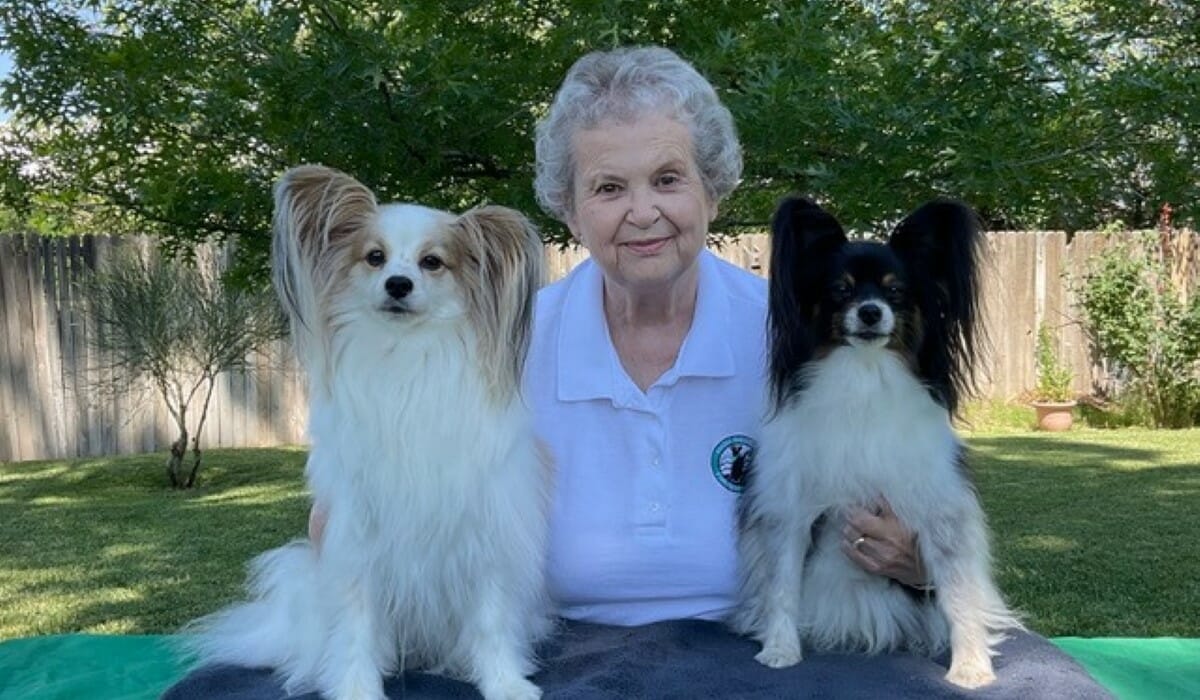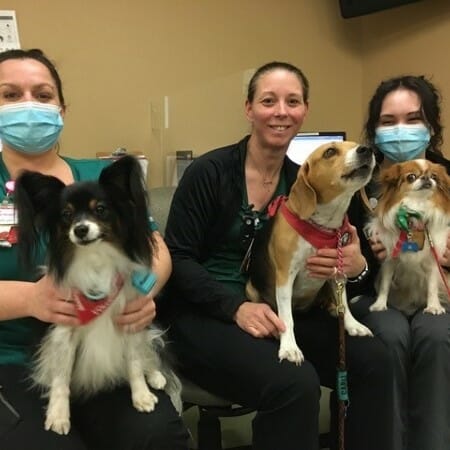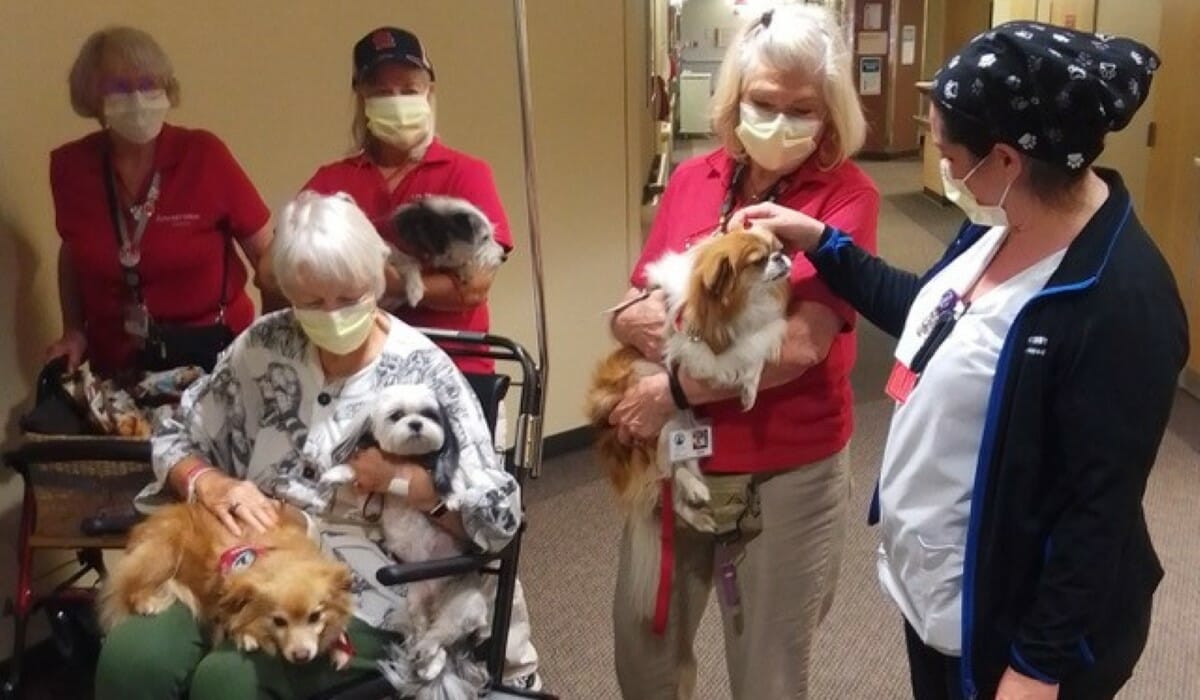Retired Electrical Engineer Organizes Therapy Dog Visits to Bring Smiles to Those Who Need it Most

Meet Daily Point of Light Award honoree Patricia Newman. During International Assistance Dog Week, August 7-13, 2022, Points of Light will be amplifying the work of service dogs, training and rescue organizations and other related groups that are helping individuals in their own communities and abroad. Do you know a volunteer doing good things with dogs? Nominate them as a Daily Point of Light.
Patricia Newman has led a fascinating life. She earned a degree in electrical engineering in a time when, as a woman, she was an outlier. She received a second degree in foreign languages and speaks Spanish, French, German and Russian fluently, as well as a bit of Japanese. She started her career at Sandia Labs, a national weapons laboratory. As a Russian speaker, she was chosen to discuss the safety and security of weapons with the Soviets after the fall of the Soviet Union, leading her to a career in technical translation.
While she has always led a life of service to the greater good, she started volunteering with High Desert Therapy Dogs after she retired. She is now the Outreach Coordinator and holds a seat on the Board of Directors.
What inspires you to volunteer?
About 10 or 11 years ago, I had retired and lost my husband. I was sitting around at home looking for something to do — I’ve always been a volunteer of various kinds — and I went to the hospital to get some medical records. As I walked through the waiting room, I saw three people with their therapy dogs meeting people and talking to them.
I was astonished at the behavior of the dogs. They were so focused on the people they were meeting and were creating such a stir in the waiting room! And I thought “I would love to do this.”
In 2020, when the pandemic broke, I decided to break off and form a smaller group called the High Desert Therapy Dogs.

Describe your volunteer role with High Desert Therapy Dogs.
I’m the secretary and database manager. I keep track of our dogs and ensure they are all certified healthy and vaccinated.
We visit hospitals, nursing homes, classrooms, libraries, private homes and anywhere else we’re needed. When the pandemic started, one of the rehabilitation hospitals I used to go to asked us to do window visits, so we would troupe around through the shrubbery and hold our dogs up to the windows. It was so touching to see people who had difficulty moving but yet they would struggle so hard to get to the window and put their hands up on the window where the dogs paws were. The smiles we got were just astonishing.
What’s been the most rewarding part of your work?
It’s the impact our dogs make on people. One woman had had a stroke and couldn’t talk, just loved to see my little Radar. He has a trick. I ask people if they want him on their lap, and if they say yes, I tell them to pat their knees, and he’ll jump up. He’s only 10-pounds, so he lands light as a feather. The smiles and the laughter I get are amazing.
One day, before she was discharged, I met her in her room instead of in the gym, and her husband was on the phone. I asked if she’d like to hold Radar, and she said “Yes.” Her husband almost dropped the phone. He said, “That’s the first word she’s spoken since she had the stroke!”
What have you learned through your experiences as a volunteer?
I’ve learned people really like dogs, and they’re eager for something to break the monotony of a hospital or nursing home or school or anything else. I’ve learned that if I walk into a room in a waiting room of a hospital, most of the people will be sitting there staring at their phones, and it will be quiet. If we walk in with dogs, before we leave, people will be talking to each other, engaging in conversation not just with us but with their neighbors sitting next to them. It’s an amazing transformation of isolated individuals to a community.

Are there any future partnerships, programs or events that you are excited about?
All of them! The lady at University of New Mexico is one of our members, and she gets us into the wildest things sometimes. We really enjoy outdoor events at the duck pond at the university and the honors college during finals week; it’s a stressful time for them.
Our campus community is very diverse. They have a lot of foreign students and people from other states along with New Mexicans. It’s a marvelous place to take your dogs and meet people from everywhere.
Why do you think it’s important for others to give back?
It’s the most rewarding thing you can do when you do something for other people. Whether it’s gathering and distributing goods or tutoring or taking your dogs to visit. It doesn’t matter. When you see the difference that your efforts make, in those people’s lives, it is so rewarding, and it keeps your mind off your own troubles.
What do you want people to learn from your story?
If anyone would like to get into pet therapy, just go online and look for therapy dog organizations. I joined the Alliance of Therapy Dogs. They offer some training, insurance and identification tags while helping you register him or her as an official therapy dog. Make sure to learn the rules before you start. Vet visits, grooming, behavior control are all important, and owners have a dress code.
Do you want to make a difference in your community like Patrcia? Find local volunteer opportunities.
